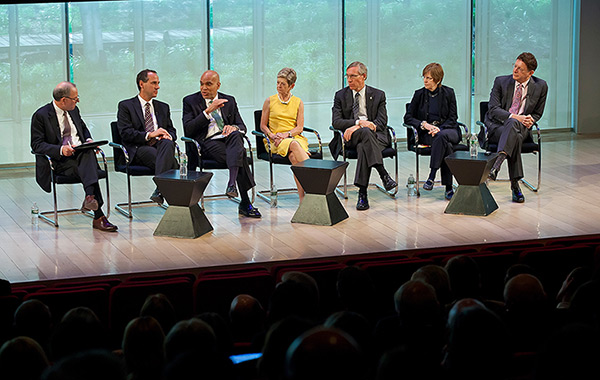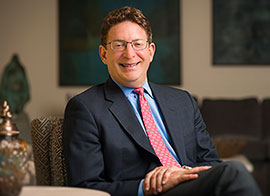In the tumultuous economy of the past 50 years, higher education has escaped the sort of creative destruction that is common in other sectors. But today, its pillars of stability are being threatened — and the conversation about how colleges and universities should change has not been as sophisticated as it needs to be.
For decades, colleges enjoyed a growing student population, favorable conditions for raising tuition, and a consensus that a college education was the gateway to a successful career. At the same time, no one was challenging — in either technology or foreign competition — the American educational model.
Now, there is a national conversation about costs, as well as a nascent debate about the value of degrees. The population of college-bound students has flattened (and their demographics are becoming more complex). Whether foreign competition will arise remains to be seen. Finally, there is the widely touted notion of online education as a fundamental, perhaps existential, threat to so-called brick-and-mortar schools. Yet, the pendulum has swung from those who, only a few years ago, were predicting a kind of apocalypse for higher education, to an increasing comfort with the status quo.
We need to go beyond that false dichotomy. Instead, it seems to me that this new era will present significant, unprecedented challenges to colleges and universities — while at the same time offering major opportunities for what has been, after all, one of the most successful parts of the U.S. economy since World War II. And, I admit, I have availed myself of management-and-growth guru Andy Grove’s dictum that “only the paranoid survive.”
Accordingly, in May, we hosted a symposium titled “Innovation + Disruption in Higher Education” at the TimesCenter in New York City to discuss the challenges that colleges are confronting. Our keynote speaker was perhaps the leading thinker on disruption in the world today: Clay Christensen, the Kim B. Clark Professor of business administration at the Harvard Business School and author of The Innovator’s Dilemma. His seminal thesis, that even well-functioning organizations can fail to recognize the technologies that will disrupt them, is profound and especially appropriate for higher education.
Joining me in a panel discussion were leaders of several colleges that helped invent the modern form of college education: Adam Falk (Williams), Raynard Kington (Grinnell), Georgia Nugent (Kenyon, emerita), David Oxtoby (Pomona), and Joan Stewart (Hamilton), with moderator Jeff Fager ’77, executive producer of 60 Minutes and chairman of CBS News. It was especially important to host this panel because a world where change is the only constant should hear from leaders with unique insights into learning, and from institutions that have been equipping students to deal with change for generations.

At the Innovation + Disruption event at the TimesCenter in New York City in May, President Jeffrey Herbst (right) gathered a group of college presidents for a panel discussion titled “Seizing the Initiative in the Digital Age” moderated by Jeff Fager ’77, executive producer of 60 Minutes and chairman of CBS News. From left: Fager, Adam Falk (Williams), Raynard Kington (Grinnell), Georgia Nugent (Kenyon, emerita), David Oxtoby (Pomona), and Joan Stewart (Hamilton). The event was sponsored by Backflip Studios, Chegg, Craftsy, The Clayton Christensen Foundation, The Disruptor Foundation, and the TimesCenter. (Photo by Lorenzo Ciniglio)
Two professors then gave dynamic presentations on their digital innovations in the liberal arts classroom. Karen Harpp of Colgate’s geology department shared the story of her evolving online course Advent of the Atomic Bomb, and Erland Stevens, professor and chair of chemistry at Davidson College, discussed his online course on Medicinal Chemistry.
Given that many of our students will soon have jobs and careers that cannot even be imagined, it has never been clearer that education for a lifetime is critical. We also face real concerns about how students will fare after graduation, which have only accelerated due to the rising cost of college and the challenging job market. To that end, our Innovation + Disruption event also included a summit for some of the country’s leading career services professionals to discuss how to help launch our graduates successfully.
Almost 400 presidents, provosts, deans, trustees, faculty, entrepreneurs, career services professionals, colleagues from high schools, and journalists — as well as many watching via Livestream feed — came together for this important gathering.
Personally, I think this is an extraordinarily exciting time to be a college leader. We are in the knowledge business at a time when knowledge is being created, transformed, and transmitted at an unprecedented rate. It is a profound moment of challenge but also one of great possibility.







